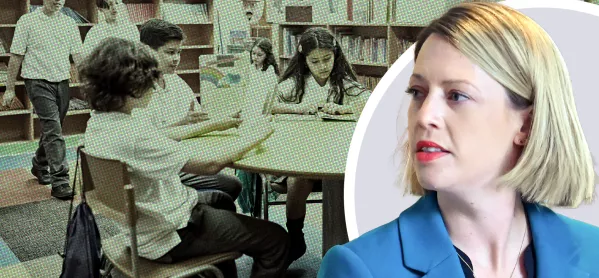Gilruth: Querying literacy and numeracy data ‘insults’ teachers

Scotland’s education secretary has hit out at those who question the accuracy of new data showing improvements in primary pupils hitting the expected level of literacy and numeracy for their age and stage.
Jenny Gilruth said that because the data was “predicated on teachers’ professional judgment”, to query it was “an insult to the teaching profession”. She “wholeheartedly” rejected suggestions that the data was not reliable.
She told MSPs in the Scottish Parliament yesterday: “Scotland’s teachers are skilled and trained professionals. The judgments that they make should be trusted, much in the same way that every year, we trust our teachers to set, mark and agree the national standard in our final examination system.”
She added that the Achievement of Curriculum for Excellence levels (Acel) data were classed as official statistics and had therefore “been produced in accordance with the professional standards that are set out in the code of practice for statistics”.
- Background: Primary literacy and numeracy achievement ‘highest on record’
- Pisa 2022: Scotland’s Pisa scores drop across the board
- News: Scotland to rejoin Timss and Pirls international education surveys
Ms Gilruth made her comments during a Scottish Conservative-led debate on falling standards in Scottish education.
The debate was instigated by the Tories in the wake of Scotland’s poor performance in the latest iteration of the Programme for International Student Assessment (Pisa), which was published on 5 December
Pisa tracks the performance of 15-year-olds in maths, reading and science; Scottish scores fell across the board.
In maths, the decline was particularly steep, with students achieving a mean score that was 18 points below that achieved four years earlier, in 2018. According to the Organisation for Economic Cooperation and Development (OECD), which runs the tests, 20 points is equivalent to a year of learning.
However, on Tuesday, the government published the Acel data on literacy and numeracy attainment in primary school and in S3.
It stood in stark contrast to the Pisa findings and found the proportion of primary pupils achieving the expected level in literacy was “the highest on record” and that this was “also true for numeracy”.
‘Marking own homework’
Commentators such as the University of Edinburgh academic Professor Lindsay Paterson questioned the reliability of the Acel figures.
He said that because the statistics were based on teacher judgment - “with no indication of how that relates to any kind of objective measure” - they were “akin to the education system marking its own homework”.
Professor Paterson also said that to suggest the Acel data trumped Pisa was “either disingenuous or evidence of dismaying statistical ignorance.”
The Acel data had previously been criticised by the OECD in its 2021 review of Scotland’s Curriculum for Excellence - it questioned whether it gave the system “the robust data needed to monitor student achievement”.
‘Most comprehensive picture’
Yesterday, Ms Gilruth said she was not “putting any data set above another” - although she did describe the Acel data as the “most comprehensive and up-to-date national picture” of attainment in literacy and numeracy.
Scotland had rejoined the Trends in International Mathematics and Science Study and the Progress in International Reading Literacy Study to provide “a wider data set”, she pointed out.
Scottish Conservative education spokesperson Liam Kerr, however, highlighted that the results of those surveys would not be available until 2026.
Mr Kerr said that Pisa garnered a lot of attention in Scotland because it was “the only league table that we can use to see how well Scotland is faring internationally”.
Reform at ‘standstill’
Ms Gilruth also responded to criticism of delays to education reform.
Labour MSP Michael Marra said the pace of education reform used to be described as “glacial”, but now it had “slowed to an absolute standstill”.
Previous education secretary Shirley-Anne Somerville promised that operating models for a new inspectorate, a new qualifications body and a new education agency would be in place by the end of 2022, but it was “the end of 2023 with nothing done at all”, he said.
Ms Gilruth said she was working as a teacher at the time that Curriculum for Excellence was introduced and that some of her “apprehension” about progressing reform now came from a desire not to “repeat past mistakes” and to “improve such changes in the future”.
She said: “It is important that, when we drive forward those changes, we do so at a pace that supports the teaching profession.”
You need a Tes subscription to read this article
Subscribe now to read this article and get other subscriber-only content:
- Unlimited access to all Tes magazine content
- Exclusive subscriber-only stories
- Award-winning email newsletters
Already a subscriber? Log in
You need a subscription to read this article
Subscribe now to read this article and get other subscriber-only content, including:
- Unlimited access to all Tes magazine content
- Exclusive subscriber-only stories
- Award-winning email newsletters
topics in this article



